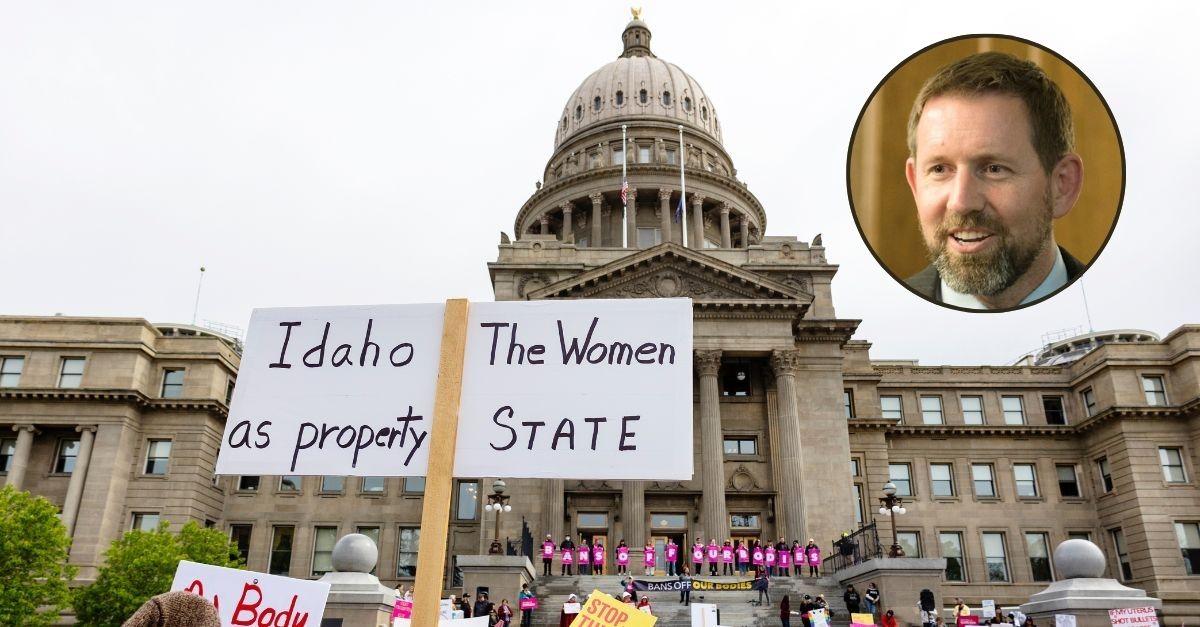
Background: FILE – An attendee at Planned Parenthood’s Bans Off Our Bodies rally for abortion rights holds a sign reading outside of the Idaho Statehouse in downtown Boise, Idaho, on May 14, 2022 (Sarah A. Miller/Idaho Statesman via AP, File). Inset: FILE – In this Sept. 23, 2014, file photo, former Montana Solicitor General Lawrence VanDyke, center, talks with law students before a Montana Supreme Court candidate forum at the University of Montana in Missoula, Mont. (AP Photo/Lido Vizzutti, File)
The full U.S. Court of Appeals for the Ninth Circuit heard arguments Tuesday in a case that will determine whether doctors can perform emergency abortion care without criminal prosecution in Idaho, a state with a near-total abortion ban.
Idaho’s abortion ban contains an exception to save a pregnant patient’s life, but not to prevent other detrimental health outcomes such as loss of future fertility. The federal Emergency Medical Treatment and Labor Act, or EMTALA, requires doctors to provide proper care in an emergency. The Biden administration has argued this care includes providing abortions to patients facing health risks and not just those facing death.
Given the clash between EMTALA and Idaho law, physicians have opted to airlift patients faced with such risks to a facility out of state rather than face legal consequence for what might later be considered a violation of Idaho law. The U.S. Department of Justice sued Idaho in 2022 to block it from enforcing its criminal abortion ban for emergency room physicians who perform abortions for pregnant patients risking health risks on the grounds that such action would be a violation of EMTALA.
In June, the U.S. Supreme Court released a 6-3 per curiam decision declaring that doctors in Idaho must resume performing abortions in medical emergencies. Justice Elena Kagan penned a concurring opinion in which she said EMTALA “unambiguously requires” that Medicare-funded hospitals provide whatever medical care is needed to get a medical emergency under control, including, “in rare situations,” abortions.
“And when a pregnancy goes terribly wrong, that treatment may be an abortion,” Kagan wrote. “Termination of the pregnancy (which is often of a non-viable fetus) may be the only way to prevent a woman’s death or serious injury, including kidney failure or loss of fertility.”
Justices Neil Gorsuch, Clarence Thomas, and Samuel Alito dissented and said, “no one who has any respect for statutory language can plausibly say that the government’s interpretation is unambiguously correct.”
The ruling, however, was a response to an emergency filing, and the underlying challenge to Idaho’s statute continued to work its way through the courts.
The Ninth Circuit heard oral arguments Tuesday to once again review the preliminary injunction. Attorney John Bursch, the conservative legal group Alliance Defending Freedom, argued the case on behalf of Idaho, and attorney Taylor Meehan represented the Legislature to defend the law.
U.S. Circuit Judge Consuelo Callahan, a George W. Bush appointee, raised the question of the effect the new presidential administration would have on the case, given that the incoming presidential team may not be interested in pursuing the legal challenge brought by the Biden administration.
“Is this an exercise in futility?” Callahan asked Bursch.
Bursch responded that the current administration sued Idaho because the “total abortion ban,” it claims, conflicts with the U.S. Emergency Medical Treatment and Labor Act, or EMTALA, which guarantees access to abortion care when it is necessary to stabilize emergency medical conditions that put a pregnant person’s health in serious jeopardy.
Judge Salvador Mendoza Jr., a Joe Biden appointee, asked Meehan if there had been any changes to Idaho law that would clarify the emergency situations where abortion care would be acceptable, Meehan said there were not.
Mendoza inquired about how doctors would know their actions would not violate the law and Meehan responded that the statute is not “about emergency care,” and “not about medical treatment,” but rather about “prohibit[ing] elective criminal abortions.”
When Lindsay Harrison, an attorney representing St. Luke’s Health System of Idaho, took the podium, she explained the underlying health conditions of the six patients sent out state by Idaho doctors and said that there are times when abortion is the only treatment sufficient to protect a pregnant person’s health.
U.S. Circuit Judge Lawrence VanDyke, a Donald Trump appointee called out by the American Bar Association for being known as “arrogant, lazy, an ideologue, and lacking in knowledge of the day-to-day practice,” pressed Harrison, asking, “Your argument is, if the mother wants to kill the baby even though it’s not necessary to prevent [death], then they have to be airlifted, is that right?”
Harrison answered that the underlying issue is a physician’s inability to immediately determine whether a pregnant patient’s life is at risk, and that patients are sent to states that permit abortion so that a full spectrum of options is available to meet the patient’s needs.
The Ninth Circuit’s ruling is expected some time during the next few months.
You can watch the Tuesday’s oral arguments here.






